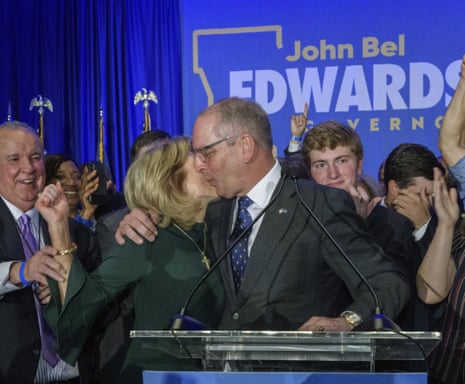In the weeks running up to Louisiana’s closely watched governor’s race, President Trump and the White House went all-in to deliver a Republican victory. The president’s son, Donald Trump Jr, headlined a rally for Republican candidate Eddie Rispone in early October, and Vice-President Mike Pence visited the state twice. President Trump himself made three trips to Louisiana on Rispone’s behalf, begging his followers in his final stop: “You’ve got to give me a big win, OK?”
While Trump’s appeal among deep south white people, especially in rural areas, spurred the president’s 20-point victory in Louisiana in 2016, his team’s aggressive stumping did little for Republicans in 2019: Democratic incumbent John Bel Edwards, a centrist Catholic and West Point graduate, won re-election with 51% of the vote.
As Louisiana native and political analyst J Miles Coleman noted, one telling result speaks to Trump’s waning influence: in the Bossier Parish precinct in northern Louisiana, where Trump held his final rally, Edwards actually gained ground, winning by 17 votes after losing it by a single vote in 2015.
It’s not that Louisiana magically turned blue in 2019. Indeed, of the state’s six congressional districts, Edwards won a majority in just one: the blue-leaning 2nd district, which includes swaths of Baton Rouge and New Orleans. While Edwards took the governor’s race, Republicans seized a super-majority in the Louisiana senate, giving them the power to override gubernatorial vetoes, and gained five seats in the Louisiana house, just two short of a super-majority. As Stephen Waguespack of the conservative Louisiana Association of Business and Industry enthused: “The [Louisiana] legislature is more conservative, more pro-business than ever before.”
The disconnect between Democrats’ victory in the governor’s race and their eroding ground in the state legislature speaks to the power of Republican gerrymandering, which has greatly diluted the electoral clout of Democrats in Louisiana and other southern states. For Democrats, this is one reason that Edwards’ victory was so critical: when Louisiana begins redistricting in 2021, Governor Edwards will have veto power over legislative and congressional maps created by the state legislature, forcing compromises that could, for example, lead to the creation of a second Democratic-leaning congressional district.
Aside from Trump’s diminishing power to inspire voters, what else might Louisiana tell us about the country’s political landscape heading into 2020? One lesson is that, if Democrats hope to succeed in 2020 – not only in the presidential contest, but all down-ticket races – they must energize and mobilize their base. In much of the south, this means African American voters. Edwards only got a majority in one congressional district, but the 85% of votes he won in the heavily African American, disproportionately urban 2nd district made all the difference. Between the 12 October primary and last weekend’s runoff in the governor’s race, turnout in the second district jumped by 42,000 voters – a critical boost in a race Edwards won by just over 40,000 votes statewide.
That mobilization didn’t happen by itself. The Power Coalition for Equity and Justice, a group of progressive community organizations in Louisiana, contacted 900,000 voters in the fall elections – mostly in communities of color – through door visits, phone calls and text messages. National groups like Black Voters Matter raised visibility about the elections in African American communities. And teachers, a key force in Edwards’ first victory in 2015 as well as Democratic governor-elect Andy Beshear’s recent win in Kentucky, also mobilized tens of thousands of voters.
This points to another important ingredient in the Democrats’ win in Louisiana: a progressive populist agenda. While Edwards drew headlines for his conservative stances on abortion and guns, he energized the Democratic base – and won over white moderates in the suburbs – through a campaign that focused on his implementation of Medicaid expansion under the Affordable Care Act, which covers more than 400,000 people in Louisiana. According to Edwards’ lead pollster, Zac McCrary, Medicaid expansion was the top factor in the governor’s victory; it was also a key issue in elections this year in Kentucky’s gubernatorial race and in Virginia, where Democrats won control of the both chambers of the general assembly.
In his victory speech, Edwards pledged his commitment to a host of progressive-populist issues which helped move his multiracial, urban and suburban coalition: investing in schools and infrastructure, support for early childhood education, an increase to the state minimum wage, and equal pay for men and women.
As for Trump? Edwards acknowledged the president’s role in Louisiana’s 2019 elections with perhaps the most blistering of southern put-downs: “God bless his heart!”
Chris Kromm is executive director of the Institute for Southern Studies, a nonprofit media, research and education center based in North Carolina, and publisher of the Institute’s online magazine, Facing South
